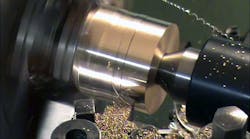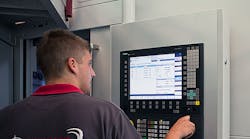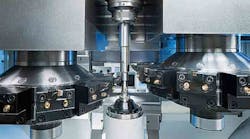The industrial trade associations representing the machine tool sectors in the U.S. and the European Union jointly issued an endorsement of the proposed Transatlantic Trade and Investment Partnership, emphasizing the need for “regulatory convergence” across the two regional markets.
“More compatible standards could lead to considerable savings and increased production efficiency in the manufacturing sector,” AMT and CECIMO declared in a joint statement, emphasizing that standardized technical requirements, specifications, standards, conformity assessment procedures and licensing procedures would enhance the competitiveness of companies operating in the respective machine tool industries.
While there has been a high-volume of trade between the U.S. and Europe for decades, and across multiple industrial sectors, proposals for a transatlantic free-trade zone have been in discussion for over two decades.
Even so, in the U.S. and other nations there are examples of “protectionism” in the form of tariffs on various materials and products. Also, the proposed Trans-Pacific Partnership has engendered much opposition from organized labor and its allies.
According to the U.S. Trade Representative’s office, the TTIP being negotiated now aims to provide “greater compatibility and transparency in trade and investment regulation, while maintaining high levels of health, safety, and environmental protection.”
At present, no draft TTIP agreement has been offered for review, and no agreement is expected to be finalized before 2016
AMT - the Association for Manufacturing Technology, represents U.S.-based manufacturers and distributors of machine tool machinery, while CECIMO is a confederation of 15 national machine-tool trade associations in the European Union. Its membership represents 98% of all machine tool production in Europe, and about 39% worldwide.
Combined, AMT and CECIMO represent over 2,000 companies, and in their joint statement they noted their agreement on support for better market opportunities and free trade.
“AMT and CECIMO welcome the commitment expressed by the European Union and the United States to reach to comprehensive Transatlantic Trade and Investment Partnership,” they stated. “The highly innovative machine-tool sector stresses the need to tackle wider area(s) than only abolishing of tariffs to provide concrete and measurable reductions to trade barriers.”
They noted that variances in EU and U.S. regulations concerning machining technologies “create different technical requirements, specifications, standards, conformity assessment procedures and licensing procedures.
“The lack of regulatory convergence forces companies to invest time and resources in duplicative procedures in order to demonstrate compliance,” their statement continued. “More compatible standards could lead to considerable savings and increased production efficiency in the manufacturing sector.”
AMT and CECIMO endorsed efforts to standardize testing procedures and authorization processes.
They also emphasized the need for the new TTIP to standardize regulatory codes and procedures, “to ensure that existing and new regulations are complementary and minimise the burden on companies. Tackling regulatory divergences between two countries will benefit businesses of all sizes and increase transatlantic trade flows,” they stated.
They further argued that TTIP should “enhance transparency in the rulemaking (and) private sector engagement, and increase opportunities to provide timely inputs.”










